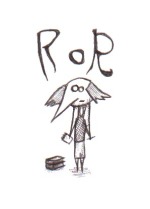Paul Collins – writer, editor and publisher – talks about the path his latest children’s book took to reach publication.
Every book has its own rite-of-passage. It starts out young and innocent as our fantasy heroes do, has a call (great enthusiasm on the part of the author) refuses the call (writer’s block); meets its mentor (perhaps the author brainstorms for ideas?); crosses the first threshold (yes! thinks the author, I have it now!); encounters a test (hmmm . . . am I writing crap the author wonders); approaches the heart of the story (author feels as though they’re back on track); receives a reward (perhaps an outline has been submitted and received positive feedback); heads for home, that being the book is completed (the author sends their beloved manuscript out); stalls at little at the climax/resurrection (author sells it after a rejection or two. Yes, some editor has braved the marketing department and persuaded them that this book is worth every cent they’re going to offer); receives its elixir/prize (it’s finally published).
My current book is The Slightly Skewed Life of Toby Chrysler. Its own journey began three years ago. However, about that time I thought I’d like to start publishing other authors’ books so I had two careers happening at once. The trouble is, I’d created a monster with Ford Street Publishing. Although publishing seven to eight books a year doesn’t sound too hectic, it’s easy to forget the major publishers have staff to edit, do accounts, market/publicity, proofread, design, liaise with authors and illustrators, write contracts, etc, etc.
Toby struggled on in dribs and drabs whenever I had a chance to work on it. I knew I wanted a character, Fluke, to have a certain character trait. I started researching malapropisms for Fluke’s character. So a decaffeinated coffee becomes a decapitated coffee; for all intent and purposes becomes for all intensive purposes; charity begins at home becomes clarity begins at home. The trick is to make sure the verbal gaffes all relate to the actual story. Some of my favourite malapropisms are the town was flooded and everyone had to be evaporated; dysentery in the ranks; and of course, Kath and Kim’s friends who are very effluent.
The characters’ names come from anecdotal stories. Toby is nicknamed Milo, because he’s not Quik. Fluke was named after his mother tried conceiving on the IVF program, gave up, then conceived. Hence, Fluke. One of the good things about a long rite-of-passage for a novel is that all of the above was discovered along the way. If I’d sat down to write this book in a three-month period (it’s only about 25,000 words long) I would’ve missed out on some (I say modestly!) nice touches.
Once I’d finished The Slightly Skewed Life of Toby Chrysler I wondered which publisher I could send it to. After all, most know me as a science fiction writer – I don’t know why this is because I’ve written many more fantasy novels than science fiction novels, but there you are!
Taking a leaf from Doris Lessing’s book (she also sent two MSS to publishers under a pseudonym) I sent the manuscript to all the major publishers under another name. Like Doris Lessing’s submissions, it was rejected. One publisher did say I could send more of my work because I “showed promise”. But one editor loved it and recommended another publisher because his company was being subsumed.
I took up his suggestion and waited . . . and waited. Five months later I withdrew the manuscript. I figured if the editor couldn’t be bothered looking at a manuscript that’s come highly recommended from an eminent editor, then perhaps that wasn’t the right publisher for me.
I was then faced with a dire predicament. Where could I send my new book? I was judging a writing competition called the Charlotte Duncan Award at the time. So under the pseudonym I sent Toby to Kathryn Duncan, the publisher at Celapene Press. It was accepted within the week and within four months it was published. So there you – a slightly skewed rite-of-passage.
There’s a weird trailer for this book.
See the first chapter of Paul Collins’ Spell of Undoing on the ROR Visiting Author page. This is one of the Quentaris Chronicle books.








